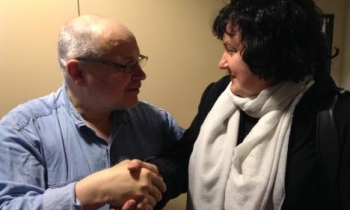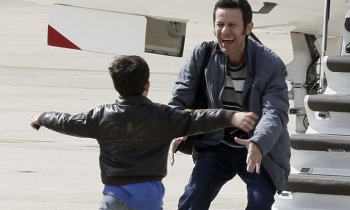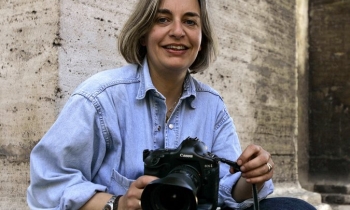Reporters sans Frontières (RSF) has called on Afghanistan President Hamid Karzai to do his utmost to ensure that the killers of the head of Peace Radio, Zakia Zaki, who was regularly threatened by warlords, are tracked down and punished.
Two armed men broke into the family home of the head of radio Sada-e-Sulh (Peace Radio) in Jabalussaraj, in the northern province of Parwan, and gunned her down in front of her two-year-old son, firing seven bullets before fleeing. Zaki, 35, had run the radio since it was founded in 2001 and was also head of a local school. She had received several death threats after openly criticising warlords and the Taliban.
Her killing follows the murder of Shakiba Sanga Amaj, who worked for Pashtu channel Shamshad TV, at her house in Kabul last Friday. Authorities say they have arrested some suspects in connection with Amaj’s murder. She had also been ordered by unidentified people to stop her work.
"Whether this savage act was linked to her work as a journalist or her civic responsibilities, it is vital that those who responsible for this murder should be quickly identified and punished," RSF said. "We urge President Karzai to commit all the necessary resources to ensure a successful outcome to the investigation and to leave no stone unturned." An investigation has been opened but no particular lead was being given priority.
"The head of Sada-e-Sulh had received several threats and her struggle for freedom of expression and women’s liberation were exemplary," RSF said.
"We are outraged at this brutal killing of a brave and respected journalist, and urge Afghan authorities to bring Zakia Zaki's killers to justice," said Comittee to Protect Journalists (CPJ) Executive Director Joel Simon. "This murder, which follows so closely on the heels of the killing of Amaj, highlights the double hazard of being a woman and being a journalist in Afghanistan."

Zaki liked to refer to Sada-e-Sulh as "a community home for the residents, the only place where they dare to express themselves freely". It is the only independent radio in Parwan province and broadcasts mainly on issues such as human rights, education and women’s rights.
The radio’s staff face constant harassment. One of its journalists, Abdul Qudoos, spent a year in prison after his arrest in February 2006 for an alleged murder attempt, on the basis of a false accusation from a woman deputy Samia Sadat. Zaki was Samia Sadat’s main rival at legislative elections and Sadat had tried to get the radio shut down, viewing it as an instrument of propaganda of her political adversaries.
In an interview with a RSF delegation in 2002, Zaki said she had received death threats from several Mujahideen chiefs. Local leaders of the Jamiat-e-islami had banned her from interviewing women in the street for her broadcasts.
The head of Afghanistan's Independent Journalists Association, Rahimullah Samander, told Radion Free Europe / Radio Liberty (RFE/RL) that Zaki had contacted his group over those threats. "She has been threatened because of some of her programs, and [the people who issued the threats] said that some [Peace Radio] reports were [critical of] one of the region's [prominent] figures; they said the programs were a plot against that person," Samander says. "Regional commanders are influential in the province and they have created problems for her several times in the past. She had come to me and told several other colleagues about it."
Samander said these recent murders have increased fear among journalists. "A large group of journalists are going from Kabul to [Zaki's hometown of] Jabalussaraj right now...to view the body of Zakia Zaki," he says. "All [journalists] are concerned. In less than two weeks, there have been four incidents -- two murders and the plunder of equipment at a radio station and the closure of a newspaper in Konduz, which happened two or three days ago."

A portrait of the journalist was included in a documentary called "If I stand up"", co-produced by UNESCO, on International Women’s Day in March 2005 as one of four eminent women journalists in Afghan society. She was a member of the Constituent Assembly in 2003.
A RFE/RL report says Afghanistan's independent media sector is in its infancy. The media sector has grown rapidly since the fall of the Taliban in late 2001. But intolerance remains, and journalists and media workers are regularly subjected to threats and harassment from former warlords and conservatives. Women are a particularly vulnerable minority in a country where culture and other forms of orthodoxy frequently conspire against female professionals.
The number of women working as journalists, reporters, or presenters has increased, but women still remain a clear minority in the country's media sector. The intimidation and threats of violence are sometimes accompanied by pressure from male-dominated families, says RFE/RL.
Shukria Barekzai, a member of parliament and former editor of a women's magazine, told RFE/RL she's distressed over the broader signals of the murders of Zaki and Amaj. "I seriously condemn [these killings], and I'm also concerned about the murder of women who are unlawfully killed merely because they work for media organizations -- they're journalists, they're intellectual women, and they fight for women's rights in Afghanistan. We are deeply worried about this," Barekzai said.









